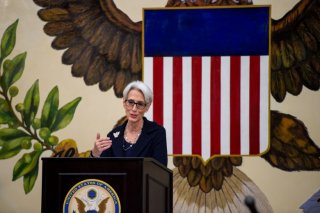America Is 'Rooting' for China
The United States' is rooting for China's rise, a top State Department official has said.
The United States is “rooting” for China’s continued rise, a senior Obama administration official reaffirmed last week.
In a recent speech at the Carnegie Endowment for International Peace, Wendy Sherman, the undersecretary of state for political affairs, gave a sweeping overview of U.S. policy towards Northeast Asia.
“Throughout the remainder of the Obama Administration,” Sherman told the think tank audience, “Northeast Asia will continue to be a major focus of U.S. foreign policy.”
That’s because, Sherman said, the Obama administration knows that international peace and prosperity increasingly hinges on this region. “Events in East Asia will inarguably affect the future of us all,” she said.
Indeed, having recently traveled to the region herself, Sherman said she “returned with a strong sense that we are at a pivotal moment; amid chronic dangers, there are also opportunities for the region to reduce tensions and became one of the globe’s sturdiest platforms for international prosperity and peace.”
China will be crucial to whatever trajectory Northeast Asia takes in the coming decades. As a result, Sherman dismissed the “suspicion in some quarters that because of our differences, America is rooting against China.” Instead, “the reality is that the United States very much wants China to be stable and prosperous.”
Sherman noted that this is not motivated by altruism but rather by a cold-eyed assessment of America’s national interest. “Certainly there is no shortage of global problems,” the U.S. and China can work to address, Sherman said during the address, noting the P5+1 negotiations with Iran and China’s stepped up efforts in Afghanistan as examples. She later noted, “We all have an interest in developing rules of the road for cyber security.”
While these global problems are important, Sherman focused the bulk of her remarks on China’s own region: Northeast Asia. “China is not the only country in East Asia that has been rising,” Sherman noted, pointing out that Japan and South Korea have also enjoyed remarkable progress since WWII.
Still, despite the remarkable progress and prosperity the region has enjoyed, it is not without its issues. To begin with, there’s North Korea, a country Sherman herself negotiated with during her stint in the Clinton administration. Sherman argued that North Korea hopes to drive a wedge between the U.S. and its allies in the region, and sees hopes to follow Pakistan’s trajectory in terms of forcing the world to accept its nuclear status. Neither is going to happen, Sherman proclaimed.
Beyond North Korea, there are deep and persistent tensions between China, Japan and South Korea over historical and territorial issues. For example, tensions over the Diaoyu/Senkaku Islands have risen in recent years, and China and South Korea remain sensitive to changes in Japan’s defense policy.
Sherman dismissed the view of some that “the past limits future possibilities for cooperation,” holding out hope for a brighter future. But peace and prosperity can only be earned with cooperation and collective will.
In wrapping up her remarks, Sherman stated: “Ultimately, the most important issue is whether the nations of East Asia act in accordance with basic principles of openness, the non-violent settlement of disputes, and respect for the rule of law.” America is working with the countries in the region to achieve that vision.
Ju-Yeong June Shin is a senior at Seoul National University. She is currently interning with the China and Pacific Team at the Center for the National Interest.

